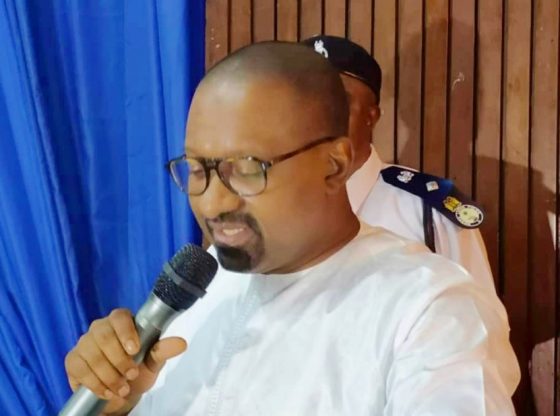By: Aaron Bundu Lahai-Head of Media & Public Relations
Dr. Mohamed Juldeh Jalloh-Vice President of Sierra Leone has made a passionate appeal to Africa countries and Global leaders for Covid-19 vaccine equity for low income countries especially sub-Saharan Africa. Vice President Jalloh stated that Global Vaccines equity remains a challenge according to statistics, he noted that should the present statistics on Global vaccines immunization continues, the chances of African population to take the vaccines will be delayed in years’ time. Vice President Jalloh therefore encouraged low-income countries to scale-up advocacy on inequality to ensure their population are vaccinated. The Vice President made the appeal during the launched of the Targeted Review Report on “Health Governance and Covid-19 Response in the Republic of Sierra Leone” on Africa Peer Review Mechanisms at the Bintumani Conference Center in Freetown on Thursday 12th August, 2021.
Vice President Jalloh informed the audience that the current statistics on global vaccines immunization shows that 46% of people in high-income countries have at least taken a shot of the Covid-19 vaccines, 20% of people in middle-income countries have taken at least a shot of the vaccines, whilst almost all sub-Sahara countries including Sierra Leone have received 0.9% vaccines. Dr. Jalloh told the participants that health governance response cannot be isolated from international dynamics, therefore the response stage should be about vaccines.
Vice President Jalloh explained that the Covid-19 outbreak in sub-Sahara Africa constituted a test on healthcare delivery. Dr. Jalloh stated that under the leadership of President Julius Maada Bio, Sierra Leone was able to brace up at an early stage of the pandemic. Vice President Jalloh highlighted leadership, experience and technology as the key elements that constituted success in the fight against Covid-19 in Sierra Leone.
Vice President Jalloh said that the Government of Sierra Leone carved out a vision and method on Covid-19 response that tested the solidity of the country’s healthcare delivery. Dr. Jalloh further told the people that the Government of Sierra Leone focus is on strengthening the healthcare system to ensure that future pandemics do not obstruct healthcare delivery. “Government response was part of the preparatory stage to build the future of healthcare in Sierra Leone” the Honourable Vice President emphasized.
The Chairperson of the Africa Peer Review Mechanism (APRM) National Governing Council in Sierra Leone Ms. Abigail Renner explained to the gathering about the mandates of the council which include providing leadership, strategic policy guidance and directions; ensuring that the review process is credible; and ensuring that the integrity of the APRM process is transparent, inclusive, and accountable.
Dr. Austin Demby-Minister of Health and Sanitation told the participants that his ministry focus on biomedical response will continue to work closely with development partners to ensure that basic healthcare services remain accessible to those most in need throughout the country. He informed the audience of the procurement of essential commodities like diagnostic tests to personal protective equipment to oxygen concentrators to vaccines among others.
Minister Demby revealed about the development of molecular diagnostic capacity throughout Sierra Leone. He revealed about the certification of six laboratories to perform RT/PCR. The laboratories he maintained can perform more than 1000 tests daily. “The three thematic areas for APRM, ‘improve Governance and Leadership, Improve human resources Allocation and Improve Health Financing’ clearly show where the Ministry of Health and Sanitation should continue to put greater emphasis going forward” Dr. Demby concluded.
Janet Mabwa-Senior Coordinator for Targeted Review at the APRM who read the statement on behalf of the Chief Executive Officer of APRM Continental Secretariat stated that “the proliferation of diseases and viruses, if unchecked, will be a menace to Africa’s long-term developmental aspirations. Inadequate infrastructure, lack of clean drinking water and sanitation are some of the pressing challenges we need to address urgently across our beloved continent.”
Coordinator Mabwa told the attendees that the country’s medical and human resources were immensely stretched during the 2014-2015 Ebola outbreak that claimed the lives of thousands of Sierra Leoneans. She noted that Sierra Leone took the Ebola case as an opportunity and put up structures for the future; these structures were activated in November 2019; four months before WHO declared Covid-19 a pandemic. Madam Mabwa informed the participants about Sierra Leone now serving as a leading example in Africa and indeed the world, in the containment of the COVID-19 pandemic.


